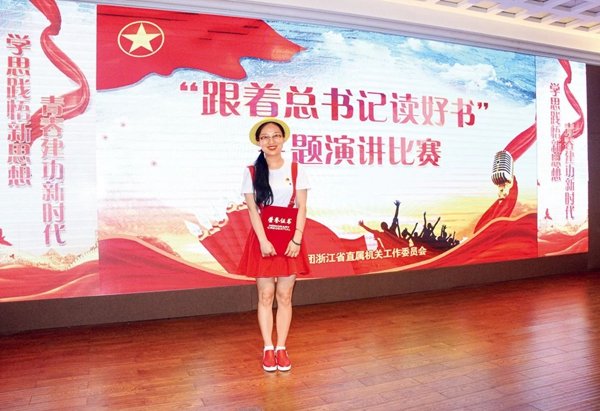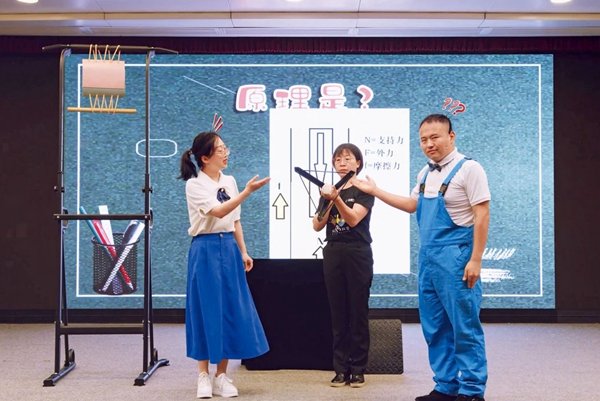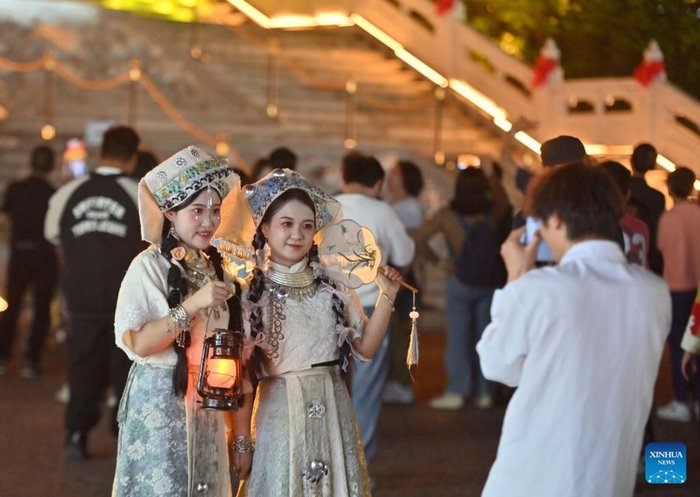Museum Instructor Cultivating 'Seeds' of Science

Ye Ying, an instructor of science and technology and a deputy research librarian with Zhejiang Science and Technology Museum, is known as a "science interpreter" among museumgoers in Hangzhou, capital of east China's Zhejiang Province. She has worked on the frontline of science popularization and education for 16 years, and she has organized more than 100 science-popularization activities.
"Many years ago, I had the pleasure of listening to a lecture given by Professor Li Xiangyi, winner of the UNESCO Kalinga Prize and former curator of China Science and Technology Museum. His speech deeply touched me, and it strengthened my determination and belief in devoting myself to the cause of science popularization," Ye says.
Planning and organizing science-popularization activities is an important part of Ye's work. "Science-popularization activities, like science-popularization exhibitions, are a very important form of education for science and technology museums. We pay attention to the participation and interaction of people during the activities, such as scientific experiments, science salons and craft-making workshops. The activities allow museumgoers to experience the fun of science," Ye says.
"Students are the key target ... Through the activities, we stimulate the students' interest and curiosity in science, cultivate their scientific thinking and innovation ability, and foster talents for the future development of science and technology. Our museum helps improve people's scientific literacy, through diverse means of science popularization, and we help create a cultural atmosphere of respecting science and advocating innovation in society," she adds.
Ye believes effective science-popularization activities should focus on people's concerns, especially on hot topics in the science and technology fields, and they should be interactive, interesting and educational, and meet the needs of different groups.
"When planning activities, we pay attention to improving participants' experiences and interaction, using concrete stories, cases and situations to present scientific knowledge, and making abstract scientific concepts more vivid and easier to understand," Ye says.

In December 2024, the museum organized a public-welfare activity for students in Daxibian Township Central Primary School, in Kaihua County, in Zhejiang Province. Ye and her colleagues presented a scientific show featuring the Magdeburg hemispheres experiment, during which the students were amazed by the mysteries of science and nature.
Ye explains how this type of science-popularization activity, which starts with scientific phenomena in daily life, makes abstract concepts concrete, inspires children to discover the truth of science, through small things and phenomena around them, and ignites their enthusiasm to explore the unknown.
In recent years, the museum has launched a series of activities, during which scientists have been invited to share the stories behind their scientific research. Ye and her colleagues have strived to develop both meaningful and interesting activities, which inspire curiosity, nurture imagination and stimulate creativity. She and her colleagues are committed to promoting the spirit of scientists, and to telling the stories of scientists well.
"As museum staff members engaged in science popularization, we are like science teachers outside of school. We bridge the distance between the public and science in a more vivid, lively and interesting way. With the development of science and technology, and the progress of the times, the spiritual and cultural needs of the public are also increasing, which results in higher requirements for science popularization," Ye says. To do a better job promoting science, Ye says science-popularization personnel should have solid knowledge and expression skills, always be improving their skills and abilities to tell science-popularization stories, and provide personalized services aimed at people with different needs.
"Scientific-experiment shows, science-popularization dramas, interactive exhibitions, science lectures, workshops and courses are all effective forms of science-popularization activities. We encourage the public to deepen their understanding of scientific knowledge, through hands-on experience," she says. In 2023, Ye was named a National Woman Pacesetter for Achievements by the ACWF for her excellent work in science popularization.
"The 'secret' to being an excellent science instructor is to keep the curiosity and thirst for knowledge, to be innovative, to keep learning, and to ride the waves with science. Only by placing deep roots in the fertile soil of science popularization, can we cultivate more beautiful seeds of science," Ye says.
"Science-popularization work has allowed me to accumulate experiences, broaden my horizons, improve my abilities, and win the support and love of many museumgoers, especially teenagers. My job is ordinary, but meaningful and fulfilling. I will give full play to my advantages, and I will explore new forms and methods of science popularization, to make science-popularization activities more vivid and diverse. I will continue to contribute my strength to improving the scientific literacy of the public, telling the stories of science popularization well, and making science more popular," Ye concludes.
Photos from Interviewee
(Women of China English Monthly March 2025)
Editor: Wang Shasha
Please understand that womenofchina.cn,a non-profit, information-communication website, cannot reach every writer before using articles and images. For copyright issues, please contact us by emailing: website@womenofchina.cn. The articles published and opinions expressed on this website represent the opinions of writers and are not necessarily shared by womenofchina.cn.








.jpg)

 WeChat
WeChat Weibo
Weibo 京公网安备 11010102004314号
京公网安备 11010102004314号